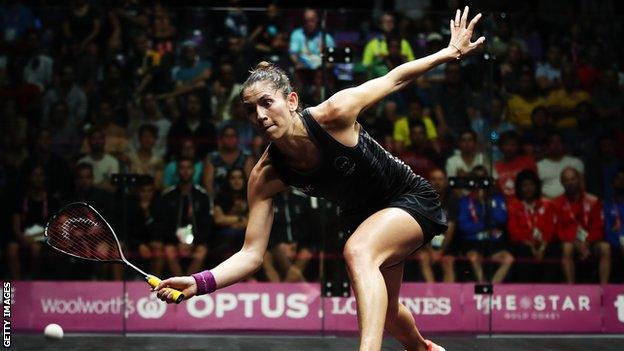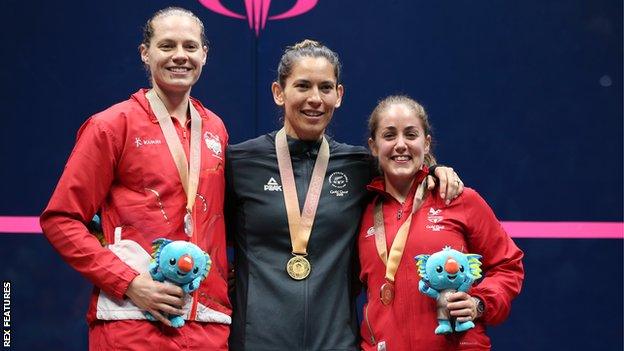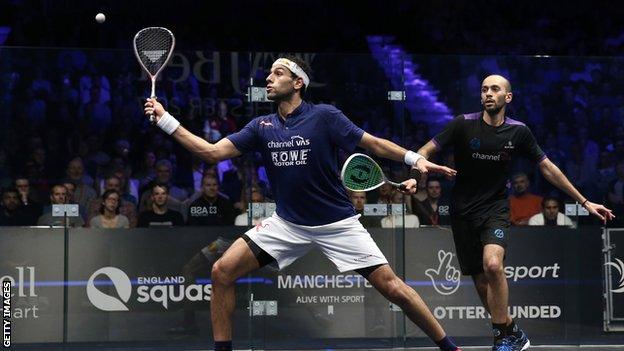How Bristol became a hotbed of worldwide squash talent
- Published

New Zealander Joelle King is a two-time Commonwealth Games gold medallist
When New Zealander Joelle King moved across the world to Bristol five years ago to try to revitalise her squash career, it had an instant impact.
Under the tutelage of coach Hadrian Stiff, five months after her relocation to England, King went to the Commonwealth Games in Australia and won two gold medals in the women's singles and doubles and a bronze in the mixed doubles squash events respectively.
This summer, the 33-year-old is aiming to defend her two titles when the Games return in Birmingham.
King is among a number of squash players who call Bristol home and have helped turn the city into a hub for professional players from all over the world.
Among them are former world champion and current men's world number three Mohamed ElShorbagy - who on Monday switched allegiance from Egypt to England - and his brother Marwan, himself ranked ninth.
There's also Egyptian Youssef Soliman and Malaysia's Eain Yow Ng - both in the top 25; and India's Joshna Chinappa, doubles champion at the 2014 Commonwealth Games.
Founded by former player Stiff, Elite Squash also houses professional players from the United States, Canada, Finland, Poland, Netherlands, Ireland and Denmark, as well as homegrown British talent.
"It was a bit of a chance meeting with Marwan ElShorbagy," King told BBC Sport.
"He sort of suggested - I didn't really have a coach at that stage in New Zealand - 'why don't you come to Bristol?'
"A couple of months later I had a message from Hadrian inviting me here to come and train.
"It's crazy to think back five years ago this journey started with him, but I'm loving being here in Bristol and loving working with him."

King (centre) is the fourth New Zealander to win the women's singles title at the Commonwealth Games
The opportunity to train with world-class athletes day in, day out, all who have a multitude of playing styles, has had an impact on King's performance and motivation.
"Where I live in New Zealand [Cambridge], it was quite isolated, some days I'd be at the club for three hours training on my own and not see anyone else," King said.
"It's quite hard to keep motivating yourself, it's hard enough as an individual sport.
"[Here] I turn up here every day and Hadrian is on court with someone. Mohamad is training, Marwan is training, Yow is training, there's so many good players.
"On those days where you turn up and you're like, 'oh I'm tired' and you see other players pushing themselves, it's pretty motivating."
The snowball effect
Elite Squash initially began more than 20 years ago as a series of summer camps run by Stiff - a former UK number one - in his home county of Devon.
However, his vision was always to "create the ultimate environment for any level of any player".
By then Stiff had moved to Bristol and established the beginnings of his brand. He was coaching junior players and realised without development opportunities at the next level, those young players would have to leave his setup to progress.
At the same time he was working with two-time junior champion [Mohamed] ElShorbagy, a prodigal talent from Egypt who had moved to Somerset to study at Millfield School.
ElShorbagy was then looking for a university to continue his studies and his squash when the University of West England, in Bristol, "pulled out all the stops" to attract him and allow him to continue training with Stiff.
Now 31, ElShorbagy has gone on to dominate world squash. Between 2014 and 2021 he spent 50 months as the men's world number one - the third-longest reign.
He won World Championship in Manchester in 2017 and has been a finalist on four other occasions - including at this May's tournament - and has three British Opens and two World Tour Finals among his 477 career wins.
His success has drawn more and more players to seek Stiff's tutelage in Bristol.

Mohamed ElShorbagy and his brother Marwan (right) have both lived and trained in Bristol for years
"When I came here there were a couple of good players, but definitely not high level players who played in the top 20, top 30," ElShorbagy said.
"Hadrian spoke to me and we made it work for me to come here, it started to be a place for other players to think maybe they can come here and do some training."
"Definitely the snowball effect is a big part," Stiff added.
"When you have someone of Mohamed's calibre coming in, and his brother Marwan coming in and then continuing to the top 10 in the world very quickly while at university, that brings people's focus to what's going on here."
Inspiring the next generation
The professional players might be the headline acts, but the centre on Bristol's Harbourside is unique for being open to players of any age and ability.
"Even though our name is Elite Squash I've always tried hard to communicate that it's literally for everyone - any level, any aspiration, no matter what you want to do with it," Stiff said.
"That's then created this melting pot of a world number one on one court, and then someone hitting a ball for the first time on another court, and then some juniors on another one."
Stiff's hope is that the more success his professional players have on the world stage, it will encourage more people to pick up a racquet.
And as squash is not an Olympic sport, this summer's Commonwealth Games is the perfect opportunity. King is among those going, with the ambition of retaining all three of her gold medals.
"It's a huge challenge to go back and defend. To win something once is hard enough, to go back and defend it is pretty tough. That's the plan and we'll see how we go," King added.
As it stands, of all the professional players living in the UK, in ElShorbagy and King, Bristol can lay claim to the top-ranked man and woman.
"When you have that in one city you can't deny that this is the best squash city in England right now," ElShorbagy concluded.

Brand-new Top Gear: The boys are back and Florida awaits...
How did the 'Wagatha Christie' trial unfold?: Here's Ros Atkins' quick summary of the libel case
